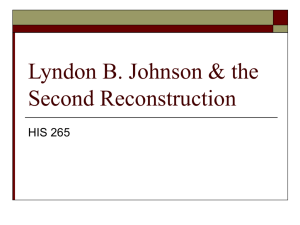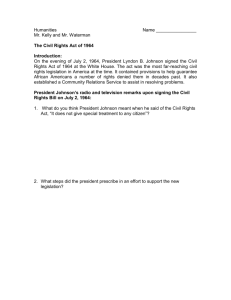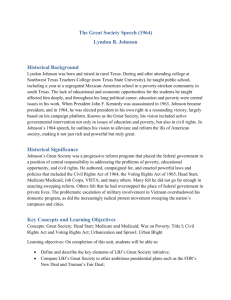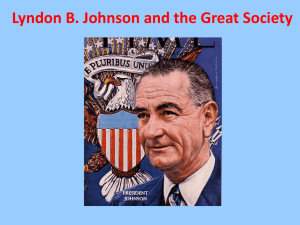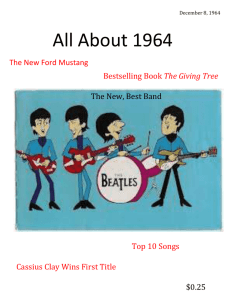Johnson*s Domestic Policy - Methacton School District
advertisement
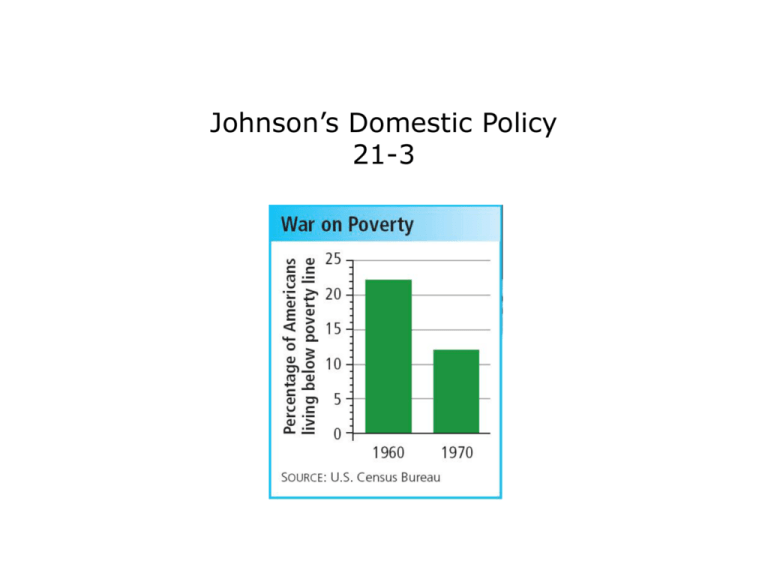
Johnson’s Domestic Policy 21-3 Terms and People • Lyndon B. Johnson – became President after Kennedy’s assassination • Civil Rights Act of 1964 – outlawed discrimination in public places and employment based on race, religion, or national origin • War on Poverty – President Johnson’s programs aimed at aiding the country’s poor through education, job training, health care, and nutrition • Economic Opportunity Act – 1964 law creating antipoverty programs Terms and People (continued) • Great Society – President Johnson’s goals in the areas of health care, education, the environment, discrimination, and poverty • Medicare – a federal program that provided basic hospital insurance for Americans aged 65 and older • Medicaid – a federal program that provided basic medical services to poor and disabled Americans • Immigration and Nationality Act of 1965 – changed America’s immigration quota system • Warren Court – Supreme Court under Chief Justice Earl Warren whose decisions supported civil rights After Vice President Lyndon B. Johnson was sworn in as President, he worked for the same goals Kennedy had championed. Johnson was a seasoned politician former Senate majority leader who built consensus in Congress to pass the Civil Rights Act of 1964. The Civil Rights Act of 1964 • Outlawed discrimination in voting, education, and public accommodations • Established the Equal Employment Opportunity Commission to fight discrimination in hiring • Prohibited discrimination on the basis of a person’s sex in public accommodations and in hiring President Johnson convinced Congress to pass a big tax cut for the middle class. He also established the War on Poverty to promote job training, education, and health care for those in need. As part of the War on Poverty, the Economic Opportunity Act of 1964 • Created the Job Corps to train young people in work skills • Established Volunteers in Service to America, or VISTA, to send volunteers into poor American communities • Formed the Head Start program to fund preschool programs In the 1964 presidential election, President Johnson defeated Barry Goldwater in a landslide. Johnson used his popularity to call for a Great Society that would end poverty and racial injustice and provide opportunity for every child. Johnson’s Great Society • Created Medicare and Medicaid • Provided funds to impoverished school districts • Passed legislation to improve air and water quality • Passed the Immigration and Nationality Act of 1965 to lift immigration quotas • Created the National Endowment for the Arts and Humanities During Johnson’s presidency, the Supreme Court decided many cases involving controversial social, political, and religious issues. Called the Warren Court after Chief Justice Earl Warren, the Supreme Court supported civil rights, civil liberties, voting rights, and personal privacy. The Warren Court ruled on many significant issues. • Voter’s rights: “one man, one vote” principle • Rights of the accused • To have a lawyer present • To have a court-appointed lawyer • To be told about rights • Prayer in school


